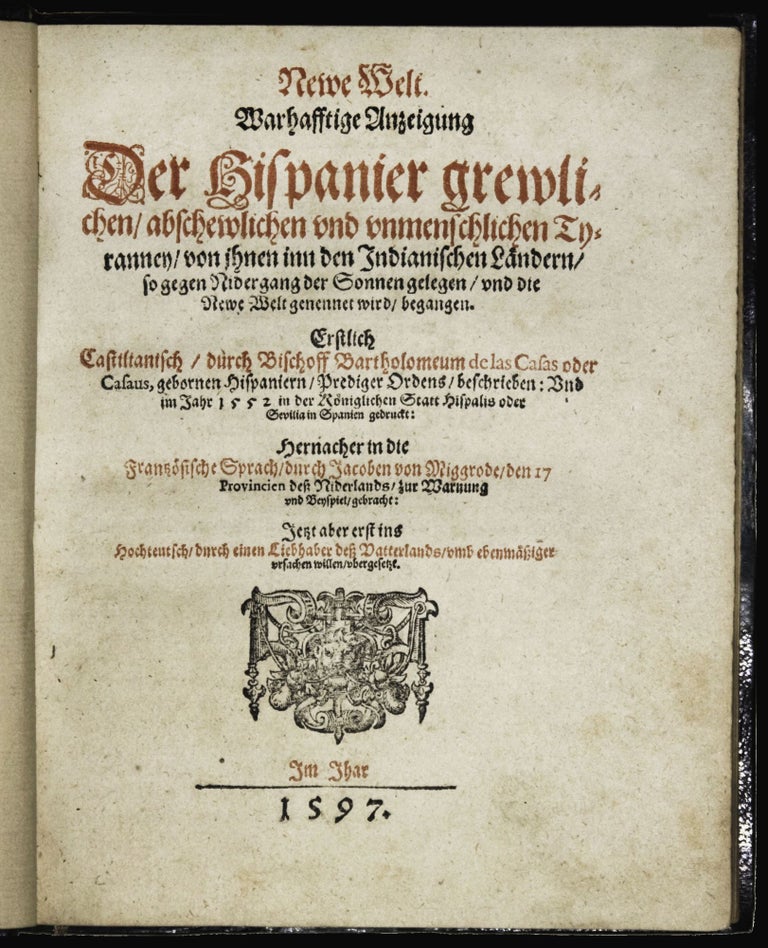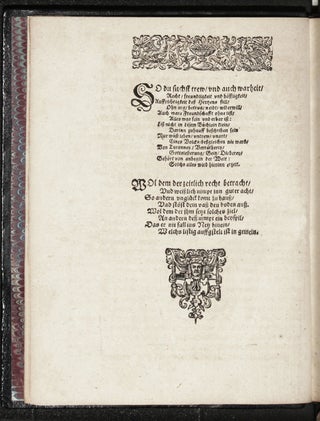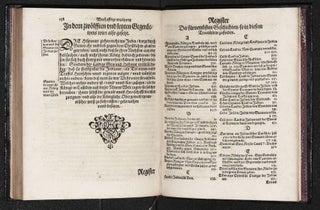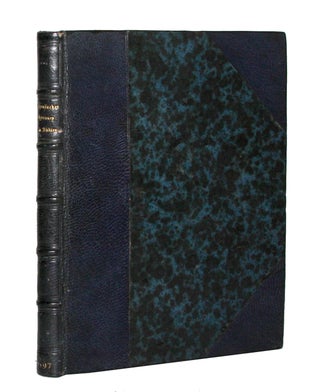Newe Welt. Warhafftige Anzeigung Der Hispanier grewlichen, abschewlichen und unmenschlichen Tyranney, von ihnen inn den Indianischen Ländern, so gegen Nidergang der Sonnen gelegen, und die Newe Welt genennet wird, begangen….
4to [18.5 x 15 cm], (8) ff, 158 pp., (6) ff., with woodcut headpieces, tailpieces and initials. Half bound in late 19th-century half midnight blue morocco over blue marbled boards, gilt title on spine, marbled endpapers, top edge gilt, silk ribbon bookmark. Spine and boards well preserved. Text lightly toned, a few contemporary marginal annotations. Generally very good. Rare first German edition of Las Casas’ excoriating eyewitness report on the Spanish in the New World, the Account of the Destruction of the Indies. The anonymous, but no doubt Protestant translator of the present work uses Las Casas’ narrative as an anti-Spanish polemic in response to the current Habsburg occupation of the Low Countries. Indeed, his preface openly encourages the Dutch to revolt against their Spanish oppressors (an opening sonnet obliquely refers to this intent). One of the most important documents for the early colonial history of the Americas, and a landmark of social criticism, Las Casas’ work was the first to decry the excesses and brutality of the European colonization of the New World, in the same breath giving birth to the ‘Black Legend’ of Spanish colonial barbarism. The Destruction of the Indies is a veritable catalogue of atrocities committed by European colonists, the overwhelming majority of which Las Casas had personally witnessed, in Hispaniola, Cuba, New Spain, etc. The descriptions are comparatively simple and concrete, with matter-of-fact enumerations reminiscent of modern Holocaust literature. Its publication in 1552 sparked an outcry. Aside from some ineffective reform legislation by the Council of the Indies, it was seized upon by readers from hostile nations as evidence for the what came to be known as the ‘Black Legend’ of Spanish cruelty, proving a powerful source of propaganda against Spanish imperial ventures well into the 18th century. In more recent times Las Casas’ reports have come to be viewed as important anthropological and sociological documents, valuable for their early anti-slavery sentiments as well as representing the viewpoint of a privileged observer of native affairs. The present translation is in fact a very partisan presentation of Las Casas’ text -- patently disguising the fact that he actually found the Germans far crueler than any other nation of conquistadors. “Whereas the text clearly refers to the German merchants as ‘demonios encarnados’ [devils incarnate], the marginal notes, more often than not, attribute the atrocities to the Spanish settlers alone… Even in the last paragraph, which addresses the Welsers’ slave trade, the commentary integrates, once more, the German actions into the larger Spanish picture, thereby diluting the attack” (Zantop, pp. 23-4). The present volume is very rare: No copies are located in Spanish institutions (according to the BNE catalogue, CCPB, and Rebiun), while OCLC locates U.S. copies only at the Library of Congress and Brown, with a further copy held by the New York Hispanic Society. We have located no copies of this title offered at public auction since 1949, and that 1949 copy (“half blue morocco, t.e.g.”) is apparently the very same example we are now offering. The anonymously published Newe Welt followed on the heels of translations of Las Casas into Dutch (1578), French (1579), and English (1583). A reprint of the present work was published by De Bry in 1599 with illustrations taken from his 1598 Latin translation of Las Casas; this is held by the NYPL, JCB, and Yale. De Bry’s German edition appeared again in 1613 (held by the NYPL and JCB only). With the most sincere thanks to Pilar Mezquita of the BNE for her valuable insights concerning this volume. * VD16 C 1232; JCB, German Americana, no. 99; J. Simón, Bibliografía de la literatura hispánica, no. 5811; Hanke-Giménez Fernández, Bartolomé de las Casas, n. 492; cf. S. Zantop, Colonial Fantasies: Conquest, Family, and Nation in Precolonial Germany (1997); see Paul B. Baginsky, (German Works Relating to America, 1493-1800, p. 12.) who suggests that another German version, translated from the French, appeared in 1597.
Sold




